Part 1 Africa Redrawing Its Own Portrait
Recently there has been a strong impulse among documentary filmmakers to reconstruct the image of Africa from an African perspective. Although Africa has long been relegated to the position of portrayal and analysis by others, these films show it revisiting the path it has travelled from a new standpoint, and reinterpreting history through its own lens.
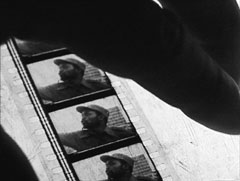 Kuxa Kanema: The Birth of Cinema
Kuxa Kanema: The Birth of Cinema
Kuxa Kanema: O Nascimento do Cinema- MOZAMBIQUE, PORTUGAL / 2003 / Portuguese / Color / Digital File / 52 min
Director: Margarida Cardoso
Photography: Lisa Hagstrand
Editing: Isabelle Rathery, Timothy Miller
Production Companies: Lapsus, Filmes do Tejo, Derives
Co-produced by: ARTE France, ARBF
Source: Margarida Cardoso
The first cultural act of Mozambique’s government right after independence in 1975, was creating the National Institute of Cinema (NIC). With the introduction of a new constitution in 1990 however, the People’s Republic of Mozambique became the Republic of Mozambique. NIC, once a great enterprise, was reduced to abandoned rooms and corridors, with the staff patiently waiting for its inevitable closing and their retirement. The building was destroyed by a fire in 1991, but the visual documents that bear witness to the first eleven years of independence—the years of the socialist revolution—were found rotting in an out-building, about to be forgotten.
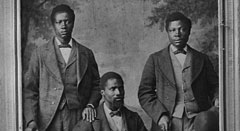 The Colonial Misunderstanding
The Colonial Misunderstanding
Le Malentendu Colonial- CAMEROON, FRANCE, GERMANY / 2004 / English / Color / Digital File / 76 min
Director: Jean-Marie Téno
Photography: Dieter Stürmer, Jean-Marie Téno
Editing: Christiane Badgley
Sound: Jean-Marie Téno, Paulin Tabou
Sound Mixing: Christophe Héral
Producers: Bärbel Mauch, Jean-Marie Téno
Jean-Marie Téno, known for his films including Africa, I Will Fleece You (YIDFF ’93), cuts into the historic crime of the colonization of Africa and the structuring of the ensuing tragedy. Téno sheds light on a “colonial misunderstanding” by examining the German missionaries that claimed it was their mission to proselytize to the non-Christians in Africa and in so doing spread European laws and culture. The film looks at Christian evangelism as the forerunner of European colonialism in Africa and, indeed, as the ideological model for the relationship between North and South even today. In particular, it looks at the role of missionaries in Namibia on the centenary of the 1904 German genocide of the Herero people there. It reveals how colonialism destroyed African beliefs and social systems and replaced them with European ones as if they were the only acceptable routes to modernity. As Professor F. Kangu Ewan says in the film, “I can forgive Westerners for taking away my land, but not for taking away my mind and soul.”
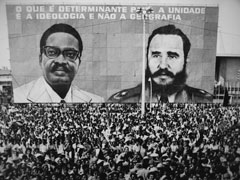 Cuba, an African Odyssey
Cuba, an African Odyssey
Cuba, une odyssée africaine- FRANCE / 2007 / French / Color / DVD / 190 min
Director: Jihan El-Tahri
Photography: Frank Peter Lehmann
Editing: Gillies Bovon
Music: Les Frères Guissé
Production Companies: Temps Noir, Big Sister
Source: Big Sister
From Che Guevara’s military campaign to avenge the assassination of the first Democratic Republic of Congo Prime Minister, Patrice Lumumba, in Congo up to the fall of apartheid in South Africa, 300,000 Cubans fought alongside African revolutionaries. Cuba, an African Odyssey is the previously untold story of Cuba’s support for African revolutions, one of the Cold War’s most vigorous contests over resources and ideology.
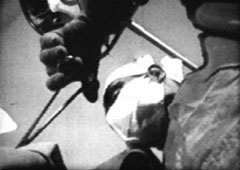 Hidden Heart: The Story of Christian Barnard and Hamilton Naki
Hidden Heart: The Story of Christian Barnard and Hamilton Naki
- SWITZERLAND, GERMANY, SOUTH AFRICA / 2008 / Xhosa, English / Color / Digital File / 93 min
Directors: Cristina Karrer, Werner Schweizer
Photography: Micheal Hammon
Sound: Jow Dlamini
Editing: Patricia Wagner
Producer: Werner Schweizer
Source: Dschoint Ventschr Filmproduktion AG
On December 3, 1967, cardiologist Christian Barnard performed the first successful heart transplant in apartheid-era Cape Town, South Africa. But he didn’t perform this feat alone. Starting in 2001, the newspapers suddenly reported that black doctor Hamilton Naki also contributed to this sensational operation. Why was Naki’s honorable deed hidden from center stage? The two are to be examined critically yet fairly through a multifaceted kaleidoscope of testimonials from carefully chosen witnesses from the period.
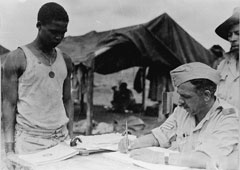 A Pair of Boots and a Bicycle
A Pair of Boots and a Bicycle
- SOUTH AFRICA / 2007 / English / Color / DVD / 88 min
Director, Source: Vincent Moloi
Photography: Edwin Wes, Vincent Moloi
Editing: Tongai Furusa
Producer: Edwin Wes
Why would men who are opressed at home valiantly fight in the war of their oppressors? And what did the triumphant victors give them, upon their return, for their “gallant and distinguished service”? In this very personal, fascinating investigation, South African documentary filmmaker Vincent Moloi journeys from the Soweto sitting rooms of veterans to El Alamein to find the answers, and in doing so unearths the significant contribution of South Africa’s black soldiers to the Allies’ North Africa campaign.
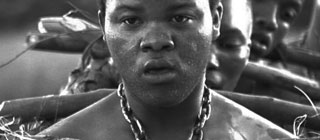 Motherland
Motherland
- USA, UK / 2010 / English / Color / Digital File / 124 min
Director, Photography: Owen ’Alik Shahadah
Editing: Betelihem Zelealem
Music: Sona Jobarteh, Ocacia, Paulino Yq
Supervising Producer: Anthony Djavan Harris
Executive Producer: Cosby Bikpe
Producer: M.K. Asante
Source: Halaqah Films
In this powerful documentary, Owen ’Alik Shahadah attempts to draw a new picture of African identity. Shahadah is known for his controversial and widely discussed 500 Years Later, which took up the present state of slavery and colonialism across the world. Fusing history, culture, politics, and contemporary issues, Motherland sweeps across Africa to tell a new story of a dynamic continent, from the glory and majesty of Africa’s past through its complex history.
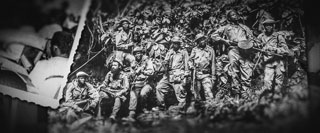 Independência
Independência
- ANGOLA / 2015 / Portuguese / Color / Digital File / 110 min
Director: Mário Bastos
Script: Conceição Neto, Paulo Lara, Mário Bastos
Photography: Kamy Lara
Editing: Charles Alexander, Kamy Lara, Zeno Monyak
Music: Victor Gama
Producers: Jorge Cohen, Paulo Lara
Source: Fradique (Mário Bastos)
For fourteen years the people of Angola fought for their independence. But shortly after it was won, there ensued a 27-year civil war that ended in 2002. Starting with memories of colonial Angola, this is the story in their own words of those who lived through and fought against Portuguese colonization and in its aftermath.
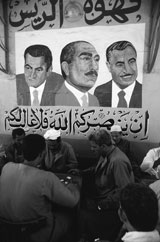 Nasser: Egypt’s Modern Pharaohs
Nasser: Egypt’s Modern Pharaohs
- EGYPT, FRANCE, SOUTH AFRICA / 2015 / Arabic, English, Russian / Color / Digital File / 97 min
Director, Producer: Jihan El-Tahri
Photography: Frank Peter Lehmann
Editing: Gillies Bovon, Phillipe Rouget
Music: Djiby Guisse
Line Producer: Karim Boutros-Ghall
Supervising Producer: Jennifer Sabbah
Executive Producer: Genevieve de Montogolifer
Source: Big Sister
After her overwhelmingly powerful transposition of modern African history to the screen in films like Cuba, an African Odyssey, Jihan El-Tahri has now turned her gaze on Egypt. Between democracy and a military dictatorship, President Gamal Abdel Nasser tried to forge a tailor-made brand of socialism to eradicate deep inequality. But in order to do so, he did not hesitate to repress and gag the opposition, while crushing civil society and leading Egypt into the War of Attrition against Israel. His sudden death rendered his socialist vision obsolete, paving the way for his successor, President Anwar Sadat.
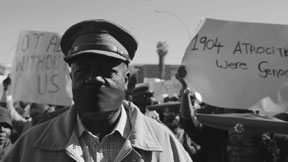 Skulls of My People
Skulls of My People
- SOUTH AFRICA, NAMIBIA / 2016 / English / Color / Blu-ray / 68 min
Director: Vincent Moloi
Photography: Marius W. van Graan, Tiyane Nyembe
Editing: Ikaye Masis
Music, Sound Design: Zethu Mashika
Producers: Makgano Mamabolo, Lodi Matsetela, Vincent Moloi
Source: Puo Pha Productions
In Namibia during German colonial rule, there was a tragic massacre of indigenous people, called the first genocide of the twentieth century. This film is the project of a young, leading South African director to document this tragic episode in which the German army reacted to a rebellion led by the indigenous Herero and Nama peoples, indiscriminately killing more than 100,000 people and taking hundreds of their bodies back to Germany in the name of science. This film starts from the plundering of the indigenous people’s land, which lies at the root of the tragedy, and leads all the way to the present with the peoples’ demand for the return of the remains from Germany. This is the story of townspeople fighting a difficult battle against a powerful enemy.
